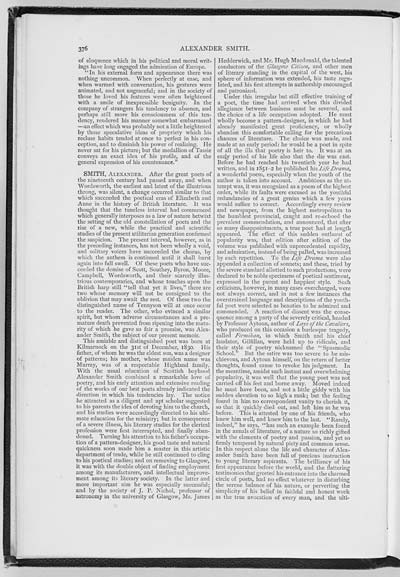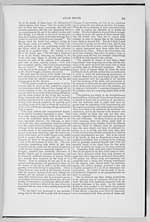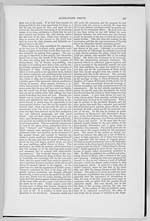Volume 3 > Half-Volume 6
(22) Page 376 - Smith, Alexander
Download files
Individual page:
Thumbnail gallery: Grid view | List view

376 of eloquence which in his political and moral writ- ings have long engaged the admiration of Europe. " In his external form and appearance there was nothing uncommon. When perfectly at ease, and when warmed with conversation, his gestures were animated, and not ungraceful; and in the society of those he loved his features were often brightened with a smile of inexpressible benignity. In the company of strangers his tendency to absence, and perhaps still more his consciousness of this ten- dency, rendered his manner somewhat embarrassed �an effect which was probably not a little heightened by those speculative ideas of propriety which his recluse habits tended at once to perfect in his con- ception, and to diminish his power of realizing. He never sat for his picture; but the medallion of Tassie conveys an exact idea of his profile, and of the general expression of his countenance." SMITH, ALEXANDER. After the great poets of the nineteenth century had passed away, and when Wordsworth, the earliest and latest of the illustrious throng, was silent, a change occurred similar to that which succeeded the poetical eras of Elizabeth and Anne in the history of British literature. It was thought that the tuneless interval had commenced which generally interposes as a law of nature betwixt the setting of the old constellation of poets and the rise of a new, while the practical and scientific studies of the present utilitarian generation confirmed the suspicion. The present interval, however, as in the preceding instances, has not been wholly a void, and solitary voices have succeeded the chorus, by which the anthem is continued until it shall burst again into full swell. Of these poets who have suc- ceeded the demise of Scott, Southey, Byron, Moore, Campbell, Wordsworth, and their scarcely illus- trious contemporaries, and whose touches upon the British harp still "tell that yet it lives," there are two whose memory will not be consigned to the oblivion that may await the rest. Of these two the distinguished name of Tennyson will at once occur to the reader. The other, who evinced a similar spirit, but whom adverse circumstances and a pre- mature death prevented from ripening into the matu- rity of which he gave so fair a promise, was Alex- ander Smith, the subject of our present memoir. This amiable and distinguished poet was born at Kilmarnock on the 31st of December, 1830. His father, of whom he was the eldest son, was a designer of patterns; his mother, whose maiden name was Murray, was of a respectable Highland family. With the usual education of Scottish boyhood Alexander Smith combined a remarkable love of poetry, and his early attention and extensive reading of the works of our best poets already indicated the direction in which his tendencies lay. The notice he attracted as a diligent and apt scholar suggested to his parents the idea of devoting him to the church, and his studies were accordingly directed to his ulti- mate education for the ministry; but in consequence of a severe illness, his literary studies for the clerical profession were first interrupted, and finally aban- doned. Turning his attention to his father's occupa- tion of a pattern-designer, his good taste and natural quickness soon made him a master in this artistic department of trade, while he still continued to cling to his poetical studies; and on removing to Glasgow, it was with the double object of finding employment among its manufacturers, and intellectual improve- ment among its literary society. In the latter and more important aim he was especially successful; and by the society of J. P. Nichol, professor of astronomy in the university of Glasgow, Mr. James Hedderwick, and Mr. Hugh Macdonald, the talented conductors of the Glasgow Citizen, and other men of literary standing in the capital of the west, his sphere of information was extended, his taste regu- lated, and his first attempts in authorship encouraged and patronized. Under this irregular but still effective training of a poet, the time had arrived when this divided allegiance between business must be severed, and the choice of a life occupation adopted. He must wholly become a pattern-designer, in which he had already manifested great proficiency, or wholly abandon this comfortable calling for the precarious chances of literature. The choice was made, and made at an early period: he would be a poet in spite of all the ills that poetry is heir to. It was at an early period of his life also that the die was cast. Before he had reached his twentieth year he had written, and in 1851-2 he published his Life Drama, a wonderful poem, especially when the youth of the author is taken into account. Ambitious as the at- tempt was, it was recognized as a poem of the highest order, while its faults were excused as the youthful redundancies of a great genius which a few years would suffice to correct. Accordingly every review and newspaper, from the highest metropolitan to the humblest provincial, caught and re-echoed the prevalent commendation, and announced, that after so many disappointments, a true poet had at length appeared. The effect of this sudden outburst of popularity was, that edition after edition of the volume was published with unprecedented rapidity, and admiration, instead of being palled, was increased by each repetition. To the Life Drama were also appended a collection of sonnets; and these, tried by the severe standard allotted to such productions, were declared to be noble specimens of poetical sentiment, expressed in the purest and happiest style. Such criticisms, however, in many cases overcharged, were not always correct, and in not a few instances the overstrained language and descriptions of the youth- ful poet were selected as beauties to be admired and commended. A reaction of dissent was the conse- quence among a party of the severely critical, headed by Professor Aytoun, author of Lays of the Cavaliers, who produced on this occasion a burlesque tragedy, called Firmihan, in which Smith and his chief laudator, Gilfillan, were held up to ridicule, and their style of poetry nicknamed the "Spasmodic School." But the satire was too severe to be mis- chievous, and Aytoun himself, on the return of better thoughts, found cause to revoke his judgment. In the meantime, amidst such instant and overwhelming popularity, it was well that the young poet was not carried off his feet and borne away. Moved indeed he must have been, and not a little giddy with his sudden elevation to so high a rank; but the feeling found in him no correspondent vanity to cherish it, so that it quickly died out, and left him as he was before. This is attested by one of his friends, who knew him well, and knew him to the last. "Rarely, indeed," he says, "has such an example been found in the annals of literature, of a nature so richly gifted with the elements of poetry and passion, and yet so firmly tempered by natural piety and common sense. In this respect alone the life and character of Alex- ander Smith have been full of precious instruction to young literary aspirants. The brilliancy of his first appearance before the world, and the flattering testimonies that greeted his entrance into the charmed circle of poets, had no effect whatever in disturbing the serene balance of his nature, or perverting the simplicity of his belief in faithful and honest work as the true avocation of every man, and the ulti-
Set display mode to:
![]() Universal Viewer |
Universal Viewer | ![]() Mirador |
Large image | Transcription
Mirador |
Large image | Transcription
Images and transcriptions on this page, including medium image downloads, may be used under the Creative Commons Attribution 4.0 International Licence unless otherwise stated. ![]()
| Biographical dictionary of eminent Scotsmen > Volume 3 > Half-Volume 6 > (22) Page 376 - Smith, Alexander |
|---|
| Permanent URL | https://digital.nls.uk/74514318 |
|---|---|
| Attribution and copyright: |
|
| Description | Volume III. Contains names alphabetically from Macadam to Young. |
|---|

